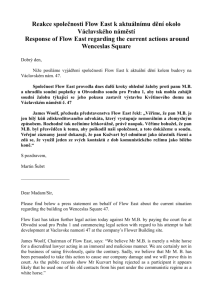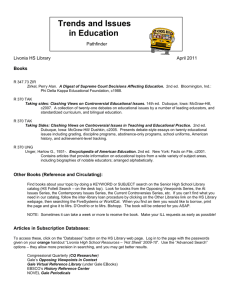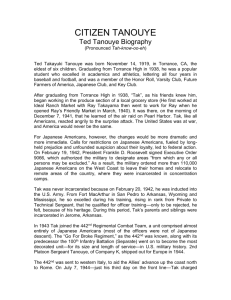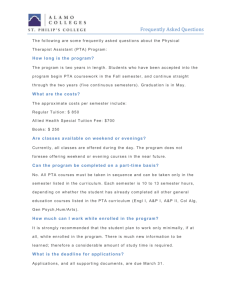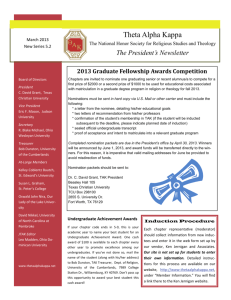tok 2011 areas overview
advertisement
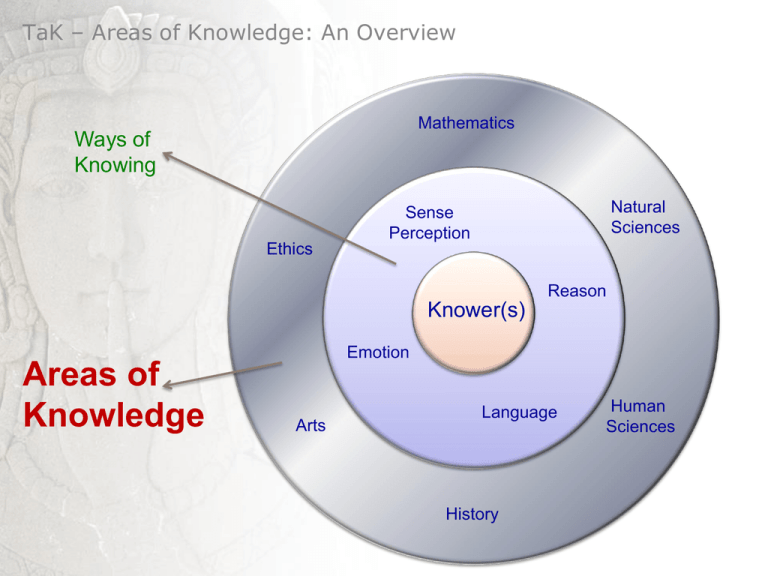
TaK – Areas of Knowledge: An Overview Mathematics Ways of Knowing Ethics Natural Sciences Sense Perception Reason Knower(s) Areas of Knowledge Emotion Arts Language History Human Sciences TaK – Areas of Knowledge: An Overview In medieval universities the faculties were divided into: Law, Religion, Medicine & Arts TaK – Areas of Knowledge: An Overview Wrote: • • Wealth of Nations The Theory of Moral Sentiments Considered himself a ‘Moral Philosopher’, not an ‘Economist’ Adam Smith 1723 - 1790 TaK – Areas of Knowledge: An Overview … but if Newton was a botanist … A–ha!…the stem of an apple is not permanently fixed to the tree! Isaac Newton 1643 - 1727: Physicist, Mathematician, Astronomer, Philosopher and Theologian TaK – Areas of Knowledge: An Overview “The rubber tree won’t yield latex. The biologist blames the sapling; The geologist blames the soil; The contractor blames the unskilled labourer; The environmentalist says the tree is fighting back against being controlled. If different Ways of Knowing yield contradictory statements about the world, on what basis do we choose among them?” ToK Prescribed Title 1997 TaK – Areas of Knowledge: An Overview “The rubber tree won’t yield latex. The biologist blames the sapling; The geologist blames the soil; The contractor blames the unskilled labourer; The environmentalist says the tree is fighting back against being controlled. If different Areas of Knowledge yield contradictory explanations about the world, on what basis do we choose among them?” ToK Prescribed Title 1997 TaK – Areas of Knowledge: An Overview To what extent are the classifications separating Areas of Knowledge justified? Mathematics Natural Sciences Ethics Areas of Knowledge Human Sciences Arts History TaK – Areas of Knowledge: An Overview Do you think there are other AoKs which should be included in the ToK diagram? TaK – Areas of Knowledge: An Overview Mathematics Natural Sciences Ethics Areas of Knowledge Human Sciences Arts History TaK – Areas of Knowledge: An Overview Perhaps we can think of the AoKs shading into one another rather than being totally separate Natural Sciences History Mathematics Human Arts Sciences Ethics Mathematics TaK – Areas of Knowledge: An Overview “This was one of the great events of my life, as dazzling as first love. I had not imagined that there was anything so delicious in the world” Bertrand Russell When he recalled his first study of Geometry TaK – Areas of Knowledge: An Overview Why do we do Mathematics? TaK – Areas of Knowledge: An Overview What could be less ambiguous, more clearly defined than a mathematical problem? A mathematical problem may not be easy to resolve, but there will be a right answer – and little room for debate. TaK – Areas of Knowledge: An Overview Maths gives relative certainty. If it presents us with reliable knowledge then we can learn precisely how it does that, and see if we can apply the techniques elsewhere. The techniques of Mathematics may provide us with a tool that will be central in our search for reliable knowledge. TaK – Areas of Knowledge: An Overview “A mathematician is cautious in the presence of the obvious” Kip TaK – Areas of Knowledge: An Overview Some key points: • Mathematics, which can be defined as the ‘science of rigorous proof’, begins with axioms and uses deductive reason to derive theorems • Although proof is the logical matter of deriving theorems from axioms, mathematicians consider some proofs to be more beautiful than others • While some people believe that mathematics is discovered, others claim it is invented; but neither view seems to be entirely satisfactory • Mathematicians and philosophers are still perplexed by the extraordinary usefulness of mathematics Natural Sciences TaK – Areas of Knowledge: An Overview All national education systems take the view that it is important to study Science. Why TaK – Areas of Knowledge: An Overview The facts are coming! The facts are TaK – Areas of Knowledge: An Overview “Science is built with facts just as a house is built with bricks, but a collection of facts cannot be called science any more than a pile of bricks can be called a house” Henri Poincare TaK – Areas of Knowledge: An Overview “We found that the theory did not fit the facts – and we were delighted, because this is how science advances” O.R. Frisch TaK – Areas of Knowledge: An Overview Key to the discoveries and developments of science have been: • Proper standards of measurement • Paper & printing • A common language of scholarship (Latin) • Developments in instrumentation TaK – Areas of Knowledge: An Overview With telescopes and microscopes, enquirers (scientists) have made rapid progress in putting questions to nature, and in formulating answers TaK – Areas of Knowledge: An Overview Can we talk about ‘scientific truths*’ or should we talk about ‘scientific beliefs*’? *a verified or indisputable fact, proposition, principle *confidence in the truth or existence of something not immediately susceptible to rigorous proof TaK – Areas of Knowledge: An Overview “Science is a way of thinking more than it is a body of knowledge” Carl Sagan TaK – Areas of Knowledge: An Overview The Scientific Method 1. 2. 3. 4. 5. 6. 7. Observation Define the question Gather information and resources (observe) Form hypothesis Perform experiment and collect data Analyze data Interpret data and draw conclusions that serve as a starting point for new hypothesis 8. Publish results 9. Retest (frequently done by other scientists) TaK – Areas of Knowledge: An Overview “You are completely free to carry out whatever research you want, so long as you come to these conclusions” TaK – Areas of Knowledge: An Overview Key Points: • The success of the natural sciences has led some people to see them as the most important form of knowledge • The traditional picture of the scientific method has science consisting of five key steps: observation, hypothesis, experiment, law, theory • Since scientific laws are based on a limited number of observations, we can never be sure they are true • According to Karl Popper, science should be based on the method of conjecture and refutations, and scientists should try to falsify hypotheses rather than verify them • (However, a hypothesis can no more be conclusively falsified than it can be conclusively verified) • Although scientific beliefs change over time, it could be argued that each new theory is closer to the truth than the previous one Human Sciences TaK – Areas of Knowledge: An Overview Anthropology Psychology History Economics Politics Law Sociology ??? TaK – Areas of Knowledge: An Overview • First born children tend to be more successful in their careers • Hierarchical relationships are inevitable in human societies • High inflation causes unemployment • There is greater social mobility in the USA than in the UK • ‘Social Status’ underlies greeting rituals in different cultures • Most boys feel jealous of their fathers TaK – Areas of Knowledge: An Overview “I am more interested in how a man lives than how a star dies” Sherwin Nuland TaK – Areas of Knowledge: An Overview “In carefully controlled laboratory conditions animals do what they damn well please” The Harvard Law of Animal Behaviour TaK – Areas of Knowledge: An Overview Sometimes political debate can look like this Why? TaK – Areas of Knowledge: An Overview The Person Swap TaK – Areas of Knowledge: An Overview The Milgram Experiment Social scientists have devised many ingenious experiments, but ethical considerations limit our ability to conduct experiments on human beings TaK – Areas of Knowledge: An Overview Key Points: • Since human beings seem to be different from other natural phenomena, we may wonder to what extent they can be studied in a purely scientific way • Some important phenomena in the Human Sciences are difficult to measure, and this can make it difficult to study them scientifically • Although a great deal of human behaviour is predictable, it is unclear how far it can be reduced to law-like regularities TaK – Areas of Knowledge: An Overview 1. In the natural sciences, a hypothesis is verified by experiment, but the social sciences cannot experiment in quite the same way 2. The natural sciences can repeat experiments in order to verify their hypotheses, and can generalize their result 3. The natural scientist, it is claimed, can isolate what his hypothesis applies to, so that his predictions are not upset by outside variables 4. Natural scientists can predict with some assurance; Social scientists cannot predict with any assurance 5. The raw material of the natural sciences can be measured with precision, but concepts in the social sciences (e.g., "army morale," "equality of opportunity," "free enterprise," "national character") are inherently vague 6. In the natural sciences, phenomena may be studied without regard to their past (an inclined plane is just what it is), whereas human beings and societies are only what they have come to be 7. In the social sciences, explanatory hypotheses may become confused because there is an unavoidable interaction between the scientist and what he studies, between his statements and the people to whom he makes them 8. In the natural sciences, it is claimed that the facts dealt with can be unambiguously isolated; whereas the social sciences face problems in establishing their hypotheses not only because the concepts used are qualitative and vague (which is claim #5), but also because social facts are contextual and holistic Selected claims of the Verstehen Position excerpted from Chapter 11 “The Social Sciences” Man is The Measure: A Cordial Invitation to the Central Problems of Philosophy by Reuben Abel; pgs. 109-120 © 1976 by the Free Press, a division of Macmillan Publishing Company. Arts TaK – Areas of Knowledge: An Overview TaK – Areas of Knowledge: An Overview What can be known through the arts? TaK – Areas of Knowledge: An Overview Velazquez Bacon TaK – Areas of Knowledge: An Overview Artists allow us to imagine ourselves in a variety of times, places and psychological states through their art. TaK – Areas of Knowledge: An Overview Art evokes feelings and also stimulates intellectual awareness by Gillian Wearing 1992 TaK – Areas of Knowledge: An Overview Art and Knowledge • Art as Communication • Art as Education • Art as Imitation TaK – Areas of Knowledge: An Overview Art and Knowledge Art as Communication TaK – Areas of Knowledge: An Overview Art and Knowledge Art as Education ‘Still Life’ by Paul Cezanne 1890 TaK – Areas of Knowledge: An Overview Art and Knowledge Art as Imitation TaK – Areas of Knowledge: An Overview What counts as Art? The intentions of the artist The quality of the work The response of the spectators TaK – Areas of Knowledge: An Overview Some key points: • The Copy Theory says the purpose of Art is to copy reality. But it could be argued that art is not so much a slavish reproduction of reality as a creative reinterpretation of it • A second theory sees Art as a means of communication which enables us to imaginatively project ourselves into new situations and communicate emotions that lie beyond everyday language • A third theory says that the Arts have an educative role and at their best broaden our awareness, develop our empathy and sharpen our moral intuitions TaK – Areas of Knowledge: An Overview Some key points: • Art of one form or another can be found in all cultures, and the desire to make aesthetically pleasing objects seems to be universal • Among the criteria for distinguishing art from non-art are the intentions of the artist, the quality of the work, and the response of the spectators • It could be argued that great art stands the test of time and is inexhaustible – in the sense that it constantly reveals new things to us History TaK – Areas of Knowledge: An Overview “Historians are dangerous people. They are capable of upsetting everything” Khruschev “He who controls the present, controls the past. He who controls the past, controls the future.” Orwell “If you do not like the past, change it.” Burton TaK – Areas of Knowledge: An Overview TaK – Areas of Knowledge: An Overview What is history? • Is it enough to define it as “the study of the past”? Concerned with: • Evidence (the present traces of the past) • Significance (concerned with significant events) • Explanation & Understanding (not only describing the past, but also explaining it) TaK – Areas of Knowledge: An Overview Some Problems of Bias Topic choice bias Confirmation bias National bias TaK – Areas of Knowledge: An Overview Why study history? History gives us a sense of identity History is a defence against propaganda History enriches our understanding of human nature TaK – Areas of Knowledge: An Overview Some key points: • History seeks to study and explain the significant events of the past on the basis of currently existing evidence • The study of History can be justified on the grounds that it contributes to our sense of identity, is a defence against propaganda, and enriches our understanding of human nature • History is based on primary sources, but since they are selective they cannot always be taken at face value • In seeking to explain the past the historian has the benefit of hindsight which can sometimes result in hindsight bias • We can perhaps get closer to the truth by exploring the past from a variety of perspectives • Historical events rarely have a single cause but are usually the result of a combination of factors Ethics TaK – Areas of Knowledge: An Overview “What should I do?” “How do I know what is the right thing to do?” “How should human beings treat each other?” TaK – Areas of Knowledge: An Overview The Study of Human Action • Ethics studies not how human beings do act (human sciences) ... • nor how they have acted in the past (history) ... • but how they should act ________ Seeks to give general perspectives that can apply to particular cases All public and private actions (whether of thought, speech or deed) have a moral and ethical dimension …. TaK – Areas of Knowledge: An Overview Definitions: • Morality is our sense of right and wrong • Ethics is the area of knowledge that examines that sense of morality and the moral codes we develop from it _________ Both words, ‘Ethics’ and ‘Morality’ have their roots in words that mean ‘Custom’ TaK – Areas of Knowledge: An Overview Some key points: • When we argue about Ethics we typically appeal to various moral principles, but we might wonder how these principles can be applied •According to moral relativism, our values are determined by the society we grow up in, but it could be argued that some core values are universal TaK – Areas of Knowledge: An Overview Environmental Ethics (for ToK Boats) TaK – Areas of Knowledge: An Overview Environmental Ethics: Our ethical rights and responsibilities towards the environment How do you think of yourself in relation to “all that stuff beyond your skin?” __________ • Value-based approaches • Psychologically-based approaches TaK – Areas of Knowledge: An Overview Environmental Ethics: Value-based approach Instrumental Value • Useful to human ends • Short-term gain through changing and using nature • Unrestrained resource use leads to depletion TaK – Areas of Knowledge: An Overview Environmental Ethics: Value-based approach Intrinsic Value • Having value in and of itself – regardless of whether of use to humans • Organisms which have moral standing have rights and are owed certain duties • Awareness-based ethics: (“Can it suffer?”) • Life-based ethics: All living things – the entire biosphere is seen as an interconnected system with moral standing • Cosmic purpose ethics: include evolutionary and theological arguments about the ultimate ends of evolution, or the nature of God’s purposes. TaK – Areas of Knowledge: An Overview Environmental Ethics: Psychologically-based approach • Sense of identification • Deep ecology • The central problem in human ecology is the relationship of mind to nature. • Concerned with the process of understanding • Concerned with the relationship between thought and action, where actions are informed not so much from a sense of moral duty, as from an inclination arising from an expansive conception of self Religion TaK – Areas of Knowledge: An Overview TaK – Areas of Knowledge: An Overview • Why are there religion(s)? • How do we assess the claims of religion? • Should religious belief be exposed to rational criticism? • What is religious knowledge? TaK – Areas of Knowledge: An Overview The Evolution of Mythology and Religion Early religion was the science and technology of its time – inasmuch as its stories sought to explain and predict; and its practices were designed to influence natural forces TaK – Areas of Knowledge: An Overview It is hard to be indifferent to claims which offer explanations about the nature of right and wrong; the purpose of life; and what happens to us after death. TaK – Areas of Knowledge: An Overview Faith: a definition “Faith is the confident belief or trust in the truth or trustworthiness of a person, idea, or thing.” http://en.wikipedia.org/wiki/Faith Faith, by definition, demands belief without a need for supporting evidence. TaK – Areas of Knowledge: An Overview Key points: • Religions are concerned with questions of meaning and purpose which trouble all human beings • Faith plays an important role in religion, but people have different views about what faith is and whether or not it is rational • The fact that there are many different religions in the world raises the question of whether they all contradict one another or whether they all point towards the same underlying truth • All religions are founded on a bedrock of personal experiences, but opinions differ about how such experiences should be interpreted • Since we will never have the answers to the deepest mysteries, it may be wise to hold our religious beliefs with a degree of humility TaK – Areas of Knowledge: An Overview Imagine the following situation: It has become possible to send messages backward in time. Yet due to the limits in the technology, only brief messages can be sent. Your job is to prepare such a message to be sent back 1000 years. (Assume any recipient would understand the language you use) What knowledge would you transmit in your message and why?

